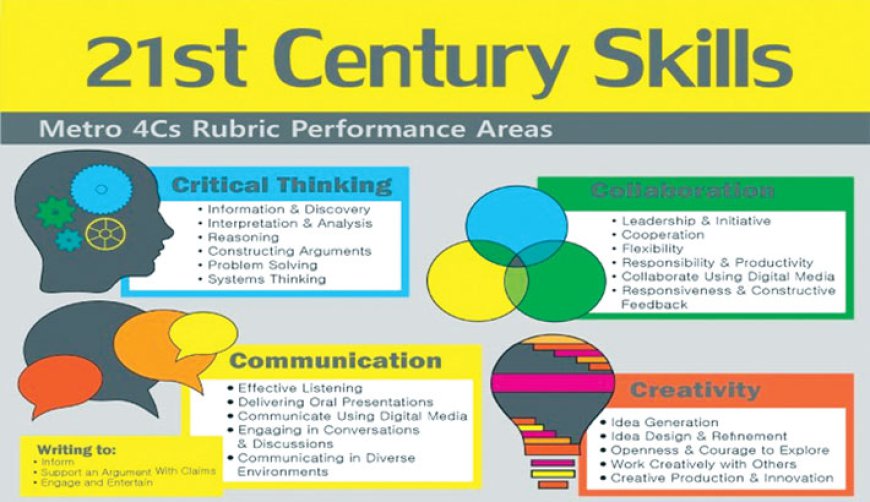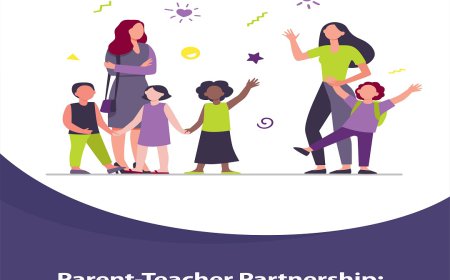In an ever-evolving global driven by means of era and innovation, the schooling landscape is continuously adapting to put together students for the challenges and possibilities of the twenty-first century. Recognizing the significance of equipping inexperienced persons with crucial talents for destiny, the
Education Department has delivered a brand new curriculum aimed at fostering 21st-century talents. This groundbreaking initiative seeks to empower college students with the know-how, talents, and mindset required to thrive in a hastily converting international.

1. The Need for 21st-Century Skills
Traditional education fashions centered on the whole on providing issue-unique expertise. However, in cutting-edge interconnected, and complex international, students want extra than simply genuine understanding. They require a fixed of abilities that enable them to navigate a dynamic and globalized society. These competencies, often known as twenty-first century abilities, include essential thinking, trouble-solving, collaboration, creativity, verbal exchange, and digital literacy.
2. An Integrated Approach
The new curriculum takes an incorporated method, weaving 21st century abilities throughout various difficult regions and grade stages. Instead of being restricted to a single standalone route, those abilities are infused throughout disciplines, permitting students to use and broaden them in actual-world contexts. By integrating these skills into present topics, the curriculum guarantees a holistic and comprehensive learning experience for college students.
3. Project-Based Learning
One of the important thing pedagogical strategies employed in the new curriculum is assignment-based totally learning. Students interact in fingers-on projects that require them to use twenty-first-century talents to resolve authentic issues. This approach fosters important questioning, creativity, collaboration, and conversation, as college students paint in groups, behavior research, analyze records, and present their findings. Project-primarily based mastering no longer best complements difficulty expertise but also nurtures important abilities wished in the place of business and society.
4. Digital Literacy and Technology Integration
The new curriculum acknowledges the large function of generation inside the modern-day world and emphasizes the development of digital literacy competencies. Students are delivered to numerous digital equipment and technology, getting to know the way to navigate, examine, and use facts correctly and responsibly. Technology integration is seamlessly woven into the curriculum, permitting college students to come to be talented customers and creators of virtual content.
5. Teacher Professional Development
Implementing the new curriculum calls for properly-organized and competent educators. The Education Department recognizes the significance of offering complete professional improvement possibilities for teachers. Training applications are designed to equip teachers with the vital understanding, competencies, and resources to efficiently combine 21st-century abilities into their teaching practices. Ongoing support and collaboration amongst educators are vital to make sure successful implementation of the curriculum.
Read more: tech news latest: AI in Medicine
6. Assessing twenty-first Century Skills
Traditional evaluation methods regularly fall brief in evaluating 21st-century abilities. The new curriculum emphasizes the usage of real and performance-primarily based tests that provide a greater accurate degree of college students' capabilities. These tests consciousness on evaluating students' vital questioning, hassle-solving, collaboration, and communique abilities, enabling educators to advantage of treasured insights into scholar development and identify regions for improvement.
7. The Impact on Future Success
By introducing a curriculum that prioritizes twenty-first-century abilities, the Education Department pursuits to equip students with the tools they need to reach an increasing number of interconnected and technology-driven worlds. These abilities not most effectively prepare students for destiny careers but additionally empower them to be active and engaged residents who can make a contribution meaningfully to their communities.
Conclusion
The
Education Department advent of a brand new curriculum focused on fostering 21st-century abilities marks a massive milestone within the evolution of education. By integrating crucial questioning, hassle-fixing, collaboration, creativity, communication, and virtual literacy in the course of the curriculum, college students are higher organized to navigate the demanding situations and opportunities of the modern-day global. This forward-thinking method of education has the capacity to transform gaining knowledge of experiences, empower college students, and shape a future in which twenty-first-century talents are at the center of schooling for all.
education news india
Follows Us for More Updates
Like Us on Facebook Page: Click Here
Like Us on Instagram: Click Here 






























